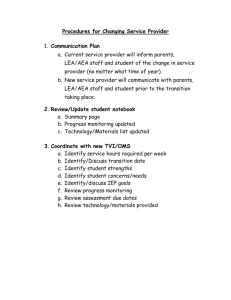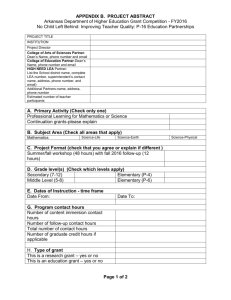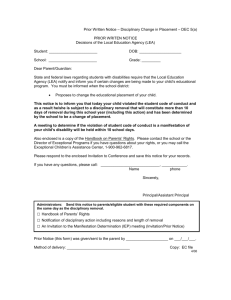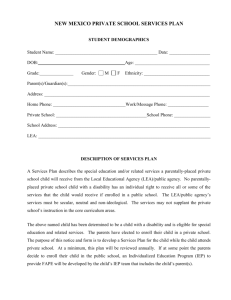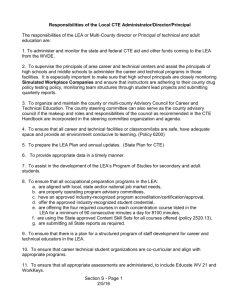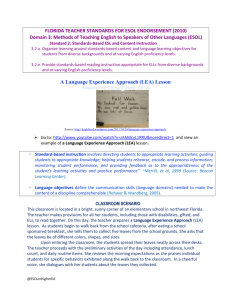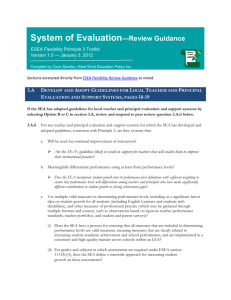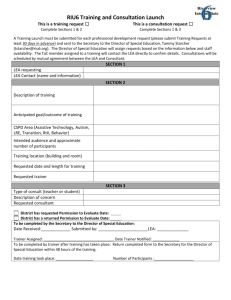Whistle Blowing Policy - Colleton Primary School
advertisement
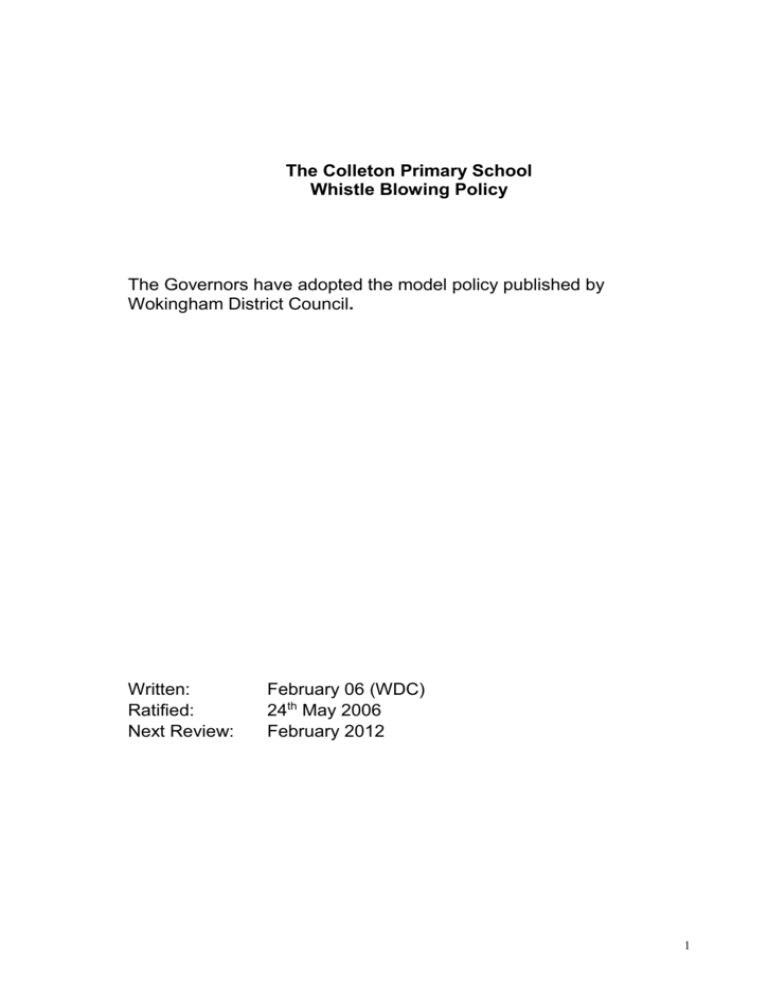
The Colleton Primary School Whistle Blowing Policy The Governors have adopted the model policy published by Wokingham District Council. Written: Ratified: Next Review: February 06 (WDC) 24th May 2006 February 2012 1 Model Whistle Blowing Policy and Procedure for Schools 2 1. Policy 1.1 Introduction Community, voluntary controlled, community special and maintained nursery schools are strongly recommended to adopt this model policy. Foundation and voluntary aided schools may also wish to adopt it. Collaborating governing bodies working together under the Collaboration Regulations 2003 may apply this policy where appropriate. 1.1.1 The School and LEA operate within legal requirements and regulations and expects all employees to co-operate in this by adhering to all laws, regulations, policies and procedures. Any employee becoming aware of another employee acting inappropriately is obliged and encouraged to report this activity. 1.1.2 The School and LEA are committed to the values of accountability, but the determined perpetrator may find a way round systems and procedures. It is therefore necessary for all managers and staff to be aware of what is required in the event of suspicions. This document sets out the procedure for employees who wish to notify any suspicions and also how the School should respond. 1.2. Purpose 1.3. To encourage employees to feel confident in raising serious concerns, to question and act upon their concerns about practice To provide them with a method of raising concerns and receive feedback on how this is being followed up To ensure employees receive a response to their concerns and they are aware of how to pursue them if they are not satisfied To reassure employees that they will be protected from possible reprisals or victimisation if they have reasonable belief that they have made any disclosure in good faith Scope 1.3.1 This policy applies to all employees and applies equally to those designated as casual, temporary, agency authorised volunteers or work experience, governors and those contractors working for the school or LEA on school or LEA premises, for example agency staff, builders, drivers. It also covers suppliers and those providing services under a contract with the LEA in their own premises 1.3.2 It also covers suppliers and those providing services under a contract with the School in their own premises. 1.3.3 The grievance procedure is in place to enable employees to lodge a concern relating to their employment. The Whistle Blowing Policy is 3 intended to cover major concerns that fall outside the scope of other procedures. These include: 1.4 Conduct which is an offence or a breach of law Disclosures related to miscarriages of justice Dangerous procedures or practice risking Health and Safety, including risks to the public as well as other employees Damage to the environment Dangerous Practices The unauthorised use of public funds Inappropriate use of the LEA’s Standing Orders, Financial procedures or Contract Regulations Fraud or corruption Practice which falls below established standards or practice Action which is contrary to the code of conduct for employees Sexual or physical abuse of pupils or others Other unethical conduct Procedure description 1.4.1 The following important principles are contained within this policy: The code is complementary to the Code of Conduct for Employees (to be drafted) It contains the provisions that are required from the Public Interest Disclosure Act 1998 The School and LEA are committed to tackling malpractice and employees should know that any matter regarding malpractice and other illegal acts will be dealt with seriously A trade union or employee representative or other representative of their choice may accompany any employee involving this procedure If a matter results in any disciplinary action, the Disciplinary Procedure will apply 1.4.2 The Whistleblowing Policy encourages and enables employees to voice their concerns without fear of victimisation, subsequent discrimination or disadvantage. 1.4.3 Employees are often the first to see or suspect something that may be seriously wrong within the School. However they may not express their concerns because they feel that speaking up would be disloyal to their colleagues or to the authority. They may also fear harassment or victimisation. 1.4.4 The Governing Body/LEA will not tolerate any harrasment or victimisation and will take appropriate action to protect employees when a concern is raised in good faith. 4 1.5 Maintaining good practice 1.5.1 The School and LEA are committed to the highest standards of openness, honesty and accountability. In line with that commitment we encourage employees, and others that we deal with, who have serious concerns about any aspect of the LEAs work to come forward and voice those concerns. It is recognised that certain cases will have to proceed on a confidential basis. 1.5.2 Expected standards of conduct and practice derive from a variety of sources including: Job descriptions Policies, Procedures and Guidelines Professional standards Legal requirements and guidelines Inspection standards and reports Code of Conduct 1.5.3 The above list is not exhaustive, but indicates the framework within which the School deliver its services. Employees should ensure that they are aware of the standards expected of them. If they are in any doubt they should discuss this with their manager or supervisor. 1.5.4 The system for maintaining good standards is founded on proper induction, supervision and appraisal, team meetings and briefing sessions, training and development and, where necessary, the positive use of the Capability and Disciplinary Procedures 1.5.5 The School recognises that the decision to report a concern can be a difficult one to make. If what employees are saying is true, they should have nothing to fear because they will be doing their duty to their employer and those who are providing a service. 1.5.6 The School will not tolerate any form of harassment or victimisation and will take appropriate action to protect employees when they raise a concern in good faith. 1.5.7 Any investigation into allegations of potential malpractice will not influence or be influenced by any disciplinary or redundancy procedures that already affect them. 1.6 Promoting good practice 1.6.1 There are several ways of promoting good practice as follows: We should lead by example. No one is perfect but it is hard to criticise others if our own practice is slip shod 5 We should know what the School’s policies and procedures expect of us and inform others who do not We should take the initiative to propose new procedures and amend old procedures Where employees are in a caring role they should ask for procedures that make it “normal” to express concern about “care” standards We should ask questions. If a colleague does something strange we should question it. There is no need for aggression but by asking why something is done in a certain way and how it will improve the service will ensure standards are maintained We should keep up to date, read professional journals, attend seminars (where appropriate) join discussion groups or joint professional groups We need to talk to fellow professionals to learn from best practice Cooperate as fully as possible with any investigation into work practices arising from complaints from a service user and share any knowledge or concerns Know what is happening in the department, read memoranda and newsletters Do not wait until something becomes a major problem. Act early, if we do not we may be condoning bad working practices. 2. Concerns 2.1 Confidentiality 2.1.1 All concerns will be treated in confidence and every effort will be made not to reveal employees’ identities if that is their wish. However, this cannot be guaranteed, if the matter is considered by an external body, outside of the School’s control, e.g. legal proceedings. 2.2 How to raise a concern 2.2.1 When an employee feels concerned about bad practice he or she will need to identify the issues carefully. An employee must be clear about the standards against which he or she is judging practice: Is it illegal? Does it contravene professional codes of practice? Is it against government guidelines? Is it against the LEAs guidelines? Is it about one individual’s behaviour or is it about general working practices? Does it contradict what the employee has been taught? Has the employee witnessed the incident? If so he or she should write it down Did anyone else witness the incident at the same time? If so they should write it down. 6 2.2.2 Who an employee should raise concerns with, depends upon on the seriousness and sensitivity of the issue involved and who is suspected of the malpractice. For example, there may be exceptional occasions when they are concerned about poor, or bad care practice by colleagues at work or where they are aware of a colleague acting in a way that is illegal, immoral, or unethical. 2.2.3. As a first step, an employee should normally raise concerns with their immediate manager/supervisor. However, if their concern is about their manager they should contact their Head Teacher/Principal 2.2.4 If an employee’s concern is about the Headteacher/Principal, he or she should contact the Chair of Governors 2.2.5 If you believe officers of the LEA more generally are involved, you should approach the Chief Executive or in case of a financial issue, Head of Internal Audit. 2.2.6 Once an employee is certain that bad practice exists the following action should be considered: Concerns may be raised verbally or in writing. Employees who wish to make a written report should give the background and history of the concern and the reason why they are particularly concerned about the situation. The earlier concerns are expressed the easier it is to take action If the employee wishes he or she may ask for a private confidential meeting with the person to whom he or she wishes to make the complaint An employee may take another person with them as a witness or for support The employee should take to the meeting – if possible - dated and signed written supporting statements from anyone who can confirm the allegations. When making the complaint verbally, the employee should write down any relevant information and date it. Keep copies of all correspondence and relevant information. The employee should ask the person to whom he or she is making the complaint what the next steps will be and if anything more is expected of them. Ask to be informed of the outcome of the investigation into the complaint. 2.2.7 Although employees are not expected to prove beyond doubt the truth of an allegation, they will need to demonstrate to the person contacted that there are reasonable grounds for their concern. 2.2.8 For further advice and/or guidance, please contact your Personnel Provider 7 2.2.9 An employee may wish to consider discussing their concern with a colleague first and they may find it easier to raise the matter if there are two people who have had the same experience or concerns. 2.2.10 Employees may ask their trade union or professional association representative to advise them, or be present during any meetings or interviews in connection with the concerns they have raised. 2.2.11 Employees will not be victimised, disciplined or disadvantaged in any way for raising genuine concerns. All employees have legal protection under the Public Interest Disclosure Act 1998. This Act protects employees from victimisation by their employer as a result of raising genuine concerns both inside or outside their organisation. However, this does not apply where allegations are found to be malicious or deliberately false. Such behaviour will be dealt with under the Disciplinary Procedure, 2.2.12 Employees also have the right to raise matters of concern under the Grievance Procedure 2.3 Anonymous Allegations 2.3.1 This policy encourages employees to put their name to any allegation whenever possible. 2.3.2 Concerns expressed anonymously are much less powerful but will be considered at the discretion of the School. 2.3.3 In exercising its discretion the factors to be taken into account would include 2.4 The seriousness of the issues raised The credibility of the concern The likelihood of confirming the allegation from attributable sources. How the School will respond 2.4.1 The individual manager hearing the concern is encouraged to take advice from their Personnel Provider. 2.4.2 Do not forget that testing out your concerns is not the same as either accepting or rejecting them. 2.4.3 Where appropriate, the matters raised may: Be investigated by management, internal audit, or in conjunction with Personnel through the disciplinary procedure, Be referred to the police Be referred to the external auditor Form the subject of an independent inquiry. 8 2.4.4. In order to protect individuals and those accused of misdeeds or possible malpractice, initial enquiries will be made to decide whether an investigation is appropriate and if so what form it should take. The overriding principle the School will have in mind is the public interest. Concerns or allegations, which fall within the scope of specific procedures (for example, child protection or discrimination issues), will normally be referred for consideration under those procedures. 2.4.5 Some concerns may be resolved by agreed action without the need for investigation. If urgent action is required this will be taken before any investigation is conducted. 2.4.5 In all cases, when an employee raises a concern, the Wokingham LEA Corporate Head of Legal Services (Monitoring Officer) and the Corporate Head of Finance (Chief Finance Officer) must be notified by the recipient of the complaint. They will assess the nature of the concern in conjunction with the LEAs Internal Audit and Insurance Manager to decide the appropriate response. 2.4.6 Within ten working days of a concern being raised, the manager hearing the concern will write to the employee, and: Acknowledge the concern has been received Indicate how the matter will be dealt with and who will be involved Where possible, give an estimate of how long it will take to provide a response Tell the employee whether any initial enquiries have been made Check whether he or she needs any personal support Tell the employee whether further investigations will take place and if not why not. 2.4.7 The amount of contact between the officers considering the issues and the employee will depend on the nature of the matters raised, the potential difficulties involved and the clarity of the information provided. If necessary, the School will seek further information from the employee, as part of the investigation process. 2.4.8. The School will take steps to minimise any difficulties which employees may experience as a result of raising any concerns. For instance, if they are required to give evidence in criminal or disciplinary proceedings, the School will arrange for them to receive support. 2.4.9 The School accepts that individuals need to be assured that the matter has been addressed. Thus, subject to legal constraints and the bounds of confidentiality, we will inform them of the outcome of any investigation, and the action that is to be taken against those whose action caused the concern. Also if appropriate, what changes are to be made to monitor procedures to ensure that a similar concern is not raised in the future. 2.5 Untrue Allegations 9 2.5.1 If employees make an allegation in good faith, but it is not confirmed by the investigation no action will be taken against them. If however, they make an allegation frivolously, maliciously or for personal gain, disciplinary action may be taken against them. In such cases, the Disciplinary Procedure will apply. 2.6 Responsible officer 2.6.1 The Chief Executive of the LEA has the overall responsibility for the maintenance and operation of the Whistle Blowing policy in respect of concerns raised formally outside the management of the school. The LEA maintain a record of concerns raised and the outcome, but in a form which does not endanger your confidentiality and reports as necessary to the Council. In respect of concerns raised internally within the school the headteacher/Principal will maintain a record of concerns raised and the outcome and will report as necessary to the Governing Body. 2.7 How matters can be taken further 2.7.1 If the employee is not satisfied with the outcome, they may take the matter to the Chair of Governors if they have not already been involved. Within ten days the Chair of Governors will write to the employee to acknowledge the concern has been received and indicate the steps that will be taken. The Chair of Governors may choose to set up a small group of governors to investigate. The Chair of Governors will then inform the employee of the outcome on the same basis as above. 2.7.2 This policy is intended to provide employees with a way to raise concerns within the School. If they are not satisfied and they feel it is right to take the matter outside the School, the employee may also raise the matter with the LEAs Chief Executive. 2.7.3 If the employee is dissatisfied with the response from the School and LEA and subject to the concern being a matter covered by the Act he/she can raise the matter, as appropriate with one of the following: An individual’s local councillor, (if he or she lives within the Council’s boundary) The external auditor The Audit Commission The individual’s trade union The local citizens advice bureau Relevant professional bodies or regulatory organisations A voluntary organisation Your solicitor The police “Public Concern at Work”, is a voluntary organisation who offer confidential legal advice to employees of any organisation. The service 10 is offered free and they can assist in helping individuals to decide if and how to take a concern forward. Tel no: 0207 404 6609. Local Unison branch – Tel no: 0118 959 6466. 2.7.4 If employees take their concerns outside of the School, this policy does not apply. They should take advice about their rights and responsibilities. Employees should also make sure that as far as possible the matter is raised without personal information relating to other employees being disclosed. 2.7.5 Any employee who unreasonably and without justification raises such issues on a wider basis, such as with the press, without following the steps and advice in this procedure may be liable to disciplinary action. 11
